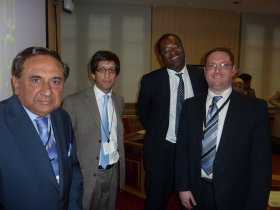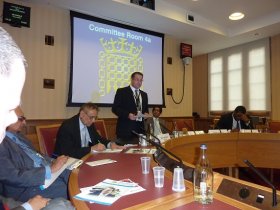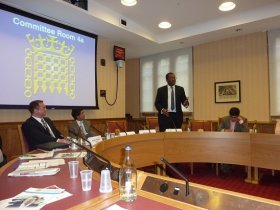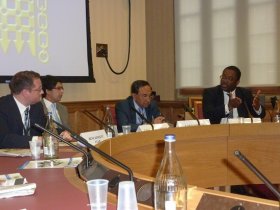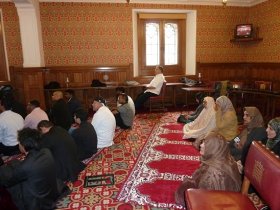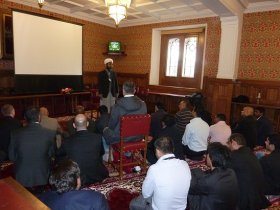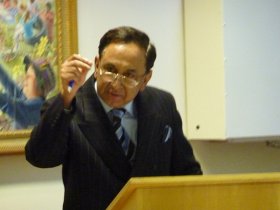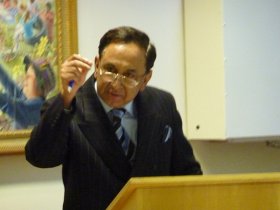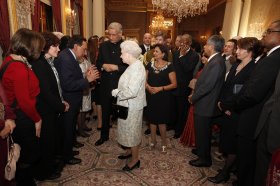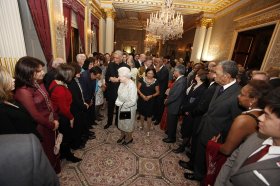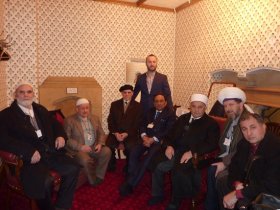Lord Sheikh was asked to speak at a Conference organised by the Muslim Teachers Association, please find a transcript of his speech below:
Education is extremely important to me. I was the first Muslim to be appointed a Peer by the Conservative Party and it is a privilege to have a Coat of Arms. My coat of arms, which was designed by the College of Arms when I was made a Peer, has the motto “iqra” which means “read” and it also shows a peacock holding two quill pens with a row of books.
These all signify the importance of my educational background and also the fact that I am very keen to promote education.
I am active in the House of Lords and speak on a variety of subjects. Over the past two weeks I have spoken on issues relating to women, the ethical fashion industry, Zimbabwe and the European Union.
In fact I have quoted from the Holy Quran and also the sayings of the Holy Prophet (peace be upon him) in the House of Lords. I believe that we are ambassadors of our religion and need to convey the true message of Islam.
Tony Blair was not the first person to say “Education, Education, Education”. It was Sir Syed Ahmad Khan, founder of the Aligarh University in India, who first coined the phrase and it was actually his motto.
In Islam, education is seen as vital. There is a verse in the Holy Quran which reads as follows:
“Read in the name of your Lord who created. Created man from a clot of blood. Read! And your Lord is the most generous. Who has taught by the pen. Taught man what he did not know”
This verse shows that Muslims believe Allah created humanity and that he commanded us to seek knowledge in order to become stronger in our faith.
The Holy Prophet (peace be upon him) has also said the following:
“Seek knowledge even unto China”
“Acquire knowledge for he who acquires it performs an act of piety, he who speaks of knowledge praises God”
“The ink of the scholar is more precious than the blood of the martyr”
The importance of education for the betterment of society is also something that is highlighted by both the Qur’an and the sayings of Prophet Muhammad (peace be upon him) who asserted that for a Muslim to fulfil their role to serve humanity, they must acquire knowledge for the common good.
For a better idea of the role of education in Islam we can look back at historic Islamic civilisations most notably in Spain.
Islamic contributions to medieval Europe were numerous, affecting various areas such as art, architecture, medicine, agriculture, music, language, education, law and technology. This period is sometimes referred to as the “Islamic Golden Age” or the “Islamic Renaissance”.
From the 10th to the 13th Century, Europe absorbed knowledge from the Islamic civilisation. In the early 20th Century a large number of scholars recognised that the influence of the Muslim civilisation as a whole on medieval Europe was enormous in such fields as science, philosophy and literature.
Contributions from the Islamic world have had a considerable effect on the development of Western civilisation and contributed to the achievements of the Renaissance.
During this period, the Islamic world developed its own sciences such as algebra, chemistry and geology which were later transmitted to the West.
I have visited the Museum of Islamic Art in Doha, and in fact was invited to its opening by the Qatari government. I was very pleased to note that some of the scientific instruments used by the Muslims in Spain and other countries are displayed in the Museum.
We are proud of our past and we did indeed lead the world in the field of astronomy, science, mathematics and medical knowledge.
We cannot live in our past and it is therefore important that we continue with our educational knowledge and rise to a premium position.
Back in that time, the Madrassa was the centre of learning, where everyone would go if they were seeking knowledge. Deen and Duniya, Islam and the World.
One of the earliest Madrassas to be established was in 959 in Cairo, Egypt and it is now known as the Al-Azhar University.
In my own family there is a great emphasis placed on education.
I used to be a lecturer but I reached a point where I had to decide whether to go into full-time lecturing or to go into business. But I worked out a compromise and I became a visiting lecturer as well as going into business.
I am now Chairman of 4 companies which include 2 insurance organisations and 2 property companies but I continue to have a deep knowledge of education and I am pleased to be here to speak to you today.
Inclusive Education covers issues such as ensuring that children with Special Educational Needs are given equal access to mainstream education – a view I strongly support.
A more topical interpretation of Inclusive Education deals with ensuring that individuals from all religions and socio-groups are given equal opportunities in education.
Education is a key pillar of social mobility and economic growth.
It is also extremely important to integration and social cohesion, especially in the diverse multi-cultural and multi-faith society that we live in today.
It provides individuals with the knowledge and skills needed to increase their incomes, boost their employment opportunities and fight social inequalities.
I value the importance of education in giving people the opportunity to improve their future prospects and have better prospects for employment and conduct of business or becoming professional.
The United Nations Educational, Scientific and Cultural Organisation estimates that just one year of schooling has the potential to increase a person’s income by 10%.
The 1948 Universal Declaration of Human Rights states that, “everyone has the right to education”.
It is an unfortunate reality that the educational attainment of a significant number of Muslim pupils and students is below the national average.
We must take action to remedy this situation as our children are our future.
Muslims are also disproportionately over-represented in the prison population. The total prison population is about 80,000 and about 10,000 of them are Muslims which is around 12%. The Muslim population in the United Kingdom is approximately 3%. This is a statistic that would surely get better if educational standards were improved.
We must remember that one third of Muslims in this country are under 16 years old, compared with one fifth of the whole population.
Therefore, I cannot stress enough how important it is that Muslim children are highly educated. It not only will help the Muslim community in the future, but the whole of society will benefit.
Parental education and involvement is proven to have a positive impact on the outcomes of pupils and students.
I have been informed that in some areas with a high population of Muslims, some parents do not attend Parents’ evenings which is not satisfactory.
Muslim community organisations and individuals have a crucial role to play in this regard. Parents need to be more involved in their child’s education and this point is very important.
We need a greater participation by Muslims in all aspects of the education system, the number of Muslim governors and teachers is low.
Muslims need to be in more positions of power within educational establishments in order to help them contribute to the important decisions that they have to make.
This year, the United Nations theme for International Women’s Day is equal access to education.
I recently spoke in a debate held on this subject in the House of Lords. I referred to this earlier.
Women have historically been deprived of chances to gain access to and further their education, and this has contributed to inequality in the workplace.
It is estimated that 16% of the world’s adult population lack basic literacy skills, two thirds of which are women and young girls.
Education plays an important role in ensuring that males and females have equal opportunities to grow and develop skills which enable them to reach their full potential.
Muslim girls from less fortunate backgrounds are still proven to have a lower chance than their British counterparts of furthering their education especially at tertiary level.
This is particularly worrying as the benefits of female education are most noticeable at this stage.
The importance of access to a broad and inclusive education cannot be overstated especially in the difference it can make to the lives of girls and women from poorer backgrounds.
By broadening their knowledge, Muslim girls and women will be empowered to make their own choices and determine their own futures.
The school establishment is the earliest social institution with which children come into regular contact, and the lessons they learn while at school help prepare them for integration into society and life after school.
Going to school also gives children an opportunity to create and develop bonds and friendships across different racial and religious groups which will help them to flourish in future and be part of British society.
I feel it is important to make reference to the shocking case of Gary Smith.
He is a teacher in East London who was brutally attacked by four Muslim men because he taught Muslim girls about other religions.
These men not only slashed his face but also fractured his skull.
I condemn their actions in the strongest terms. Mr Smith was merely doing his job as Head of Religious Education at the Central Foundation Girls’ School.
When I was at school in Uganda I had several friends of different religions and I also learnt to speak six different languages.
Learning about other religions is important as it enables children to develop an understanding of the various groups that live in their community.
It is absurd that Muslims should miss out on learning about other religions just because a select few view this as unacceptable.
One of the problems in this respect has been the doctrine of state multiculturalism.
Under state multiculturalism, we have a situation where different cultures have been encouraged to live separate lives, apart from each other and apart from the mainstream.
The Prime Minister made clear that we must build stronger societies and stronger identities at home, promoting values such as freedom of speech.
This is what defines us as a society. We need a clear sense of shared national identity that is open to everyone.
I feel that we also need to look at what we want the children to achieve by going to school.
High grades and qualifications are something that obviously are very desirable and will help the children in their lives going forward.
But another aspect that is often overlooked is that our children should come out of school as good Muslims and well-rounded human beings that are also a benefit to society as a whole.
I believe that schools should not just be an academic institution but should also promote civic values.
They must also encourage ways to promote cultural and community awareness and cohesion.
This was made a requirement for schools in the Education and Inspections Act 2006.
I am pleased that the Government is continuing to promote this in the Education Bill.
The Bill stipulates that Ofsted must consider how well schools provide for different cultures and how understanding the world around us promotes an understanding of the community.
I am proud that the Muslim faith views knowledge and educational attainment as invaluable.
Some Madrassas have historically gained unfair media attention for accusations of breeding extremist views.
We here today are aware that this is simply not true.
It is therefore our responsibility to express this message clearly to the wider British society.
One way of doing this would be to bring Madrassas under the mainstream school curriculum and make them subject to Ofsted inspections.
This would give communities and teachers greater confidence in the Madrassa system of education.
It is important that our children have access to a universal education of high quality.
I would like to say a few words about the importance of volunteering and public service.
I feel that Madrassas could incorporate an element of community volunteer work for students and also encourage them to choose careers where they have the opportunity to serve the wider British public.
These proposals are certain to dispel unwelcome myths about Muslim schools.
I have also encouraged young Muslims to join the Army and the police force.
I supported the Armed Forces Muslim Association and its patron is General Sir David Richards who is the Chief of Staff of the Armed Forces.
Faith schools are an important part of the education system, offering diversity and choice to parents, as well as helping improve standards.
Faith-based Academy and Free schools are expected to have inclusive admissions policies.
The Department for Education has established a due diligence committee that will monitor all Free Schools applications to ensure that religious extremism is not promoted.
Furthermore, Free Schools have to admit 50 per cent of pupils without reference to faith.
They will also be subject to meeting rigorous inspection criteria and performance targets.
The success of the school will be judged on its ability to provide a well-rounded, good quality education.
The School Standards and Framework Act 1998 states that schools with a religious charter must provide specialist teachers selected to teach religious education.
These teachers must not exceed one-fifth of the total number of teachers in the school.
This will ensure that non-faith based pupils are given equal opportunity to focus on academic education outside of the faith-based school ethos.
It is important to broaden the appeal of schools with a traditionally high population of Muslims by welcoming those from outside the faith.
Religion can help to bring local communities together and can promote a neighbourly society that too often seems to have been eroded.
We can only benefit from our religious diversity if we sustain the freedom for religions to reflect their differences.
It is through reinforcing such ideas that strong community links will be forged. This will also ensure that our children are taught the importance of cultural and community values.
